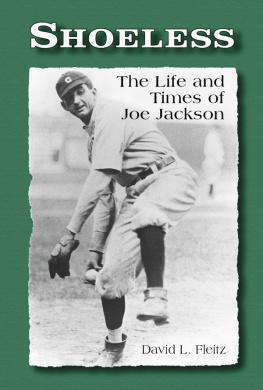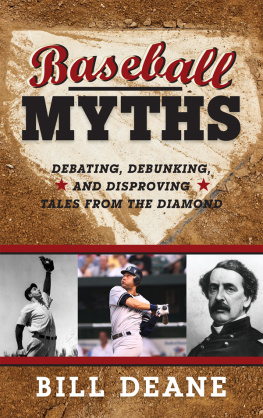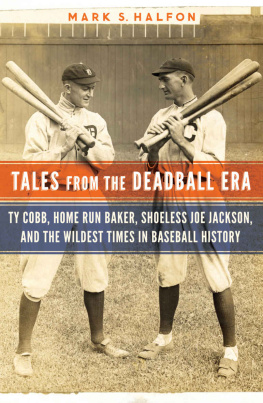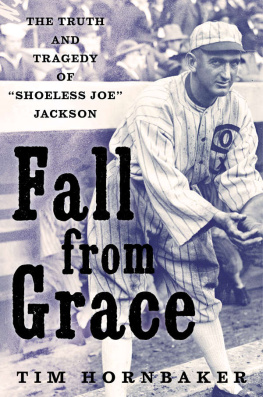About the Author
Harvey Frommer has written 29 books and over 600 articles, mostly on sports subjects. The author of the classic New York City Baseball: 19471957 and the bestselling Throwing Heat, Nolan Ryans autobiography, he is a professor of English in the City University of New York. Together with his wife Myrna, he wrote It Happened in the Catskills, an oral history of the resort region. They are currently at work on another oral historythis one dealing with Brooklyn, New York, in the postwar years. Harvey Frommer lives with his family in North Woodmere, Long Island.
Acknowledgments
At the top of the list is my severest critic and greatest allymy wife Myrna. This book has her deft touch and writing insights on each and every page.
A tip of the hat goes to my excellent editor, Jim Donovan. He was there from start to finish, capably coaching away.
Others who make the list: Virginia Stannard of the Greenville County Library, Bill Jenkinson, Wayne Cunningham, The Sporting News, and the National Baseball Hall of Fame.
Finally, special thanks to my son Freddy for his careful proofreading and on-target queries.
Appendix
The Grand Jury Testimony of Joe Jackson
(as recorded by E.A. Eulass & Co., Court and General Stenographic Reporters)
BASEBALL INQUIRY Tuesday, September 28, 1920
GRAND JURY 3:00 P.M.
JOE JACKSON,
called as a witness, having been first duly sworn, testified as follows:
EXAMINATION BY
Mr. Replogle
Q Mr. Jackson, you understand that any testimony you may give here can be used in evidence against you at any future trial; you know who I am, I am States Attorney, and this is the Grand Jury, this is the Foreman of the Grand Jury. Now, I will read this immunity waiver to you so you will know just what it is:
Chicago, Illinois, September 28, 1920. I, Joe Jackson, the undersigned, of my own free will make this my voluntary statement and am willing to testify and do testify before the Grand Jury with full knowledge of all the facts and of my legal rights, knowing full well that any testimony I may give might incriminate me, and might be used against me in any case of prosecution or connected with the subject matter of my testimony, and now having been fully advised as to my legal rights, I hereby with said full knowledge waive all immunity that I might claim by reason of my appearing before the Grand Jury and giving testimony concerning certain crimes of which I have knowledge.
(Whereupon the witness signed the foregoing document)
Q What is your name?
A Joe. Jackson.
Q Where do you live, Mr. Jackson?
A You mean in the City here?
Q Where is your home?
A Greenville, South Carolina.
Q What is your business?
A Baseball player.
Q How long have you been playing professional baseball?
A Since 1908.
Q Where have you played professional baseball?
A Why, I started out in Greenville, South Carolina; went from there to Philadelphia, Philadelphia Americans.
Q How long were you with them?
A I went in the fall of 1908, and went to Savannah, Georgia.
Q How long were you there?
A Finished the season there, and I was called back by the Athletics; from there went to New Orleans, in 1910; 1910 in the fall I came to Cleveland and stayed with Cleveland until 1915, and I have been here ever since.
Q Did you play with the White Sox from 1915?
A About the middle of the season I was there.
Q Are you married or single?
A Married.
Q How long have you been married?
A Been married thirteen years this coming July.
Q Have you any children?
A No, sir.
Q Is your wife in Chicago at the present time?
A Yes, sir.
Q Where is your Chicago address?
A Trenier Hotel, 40th and Grand Boulevard.
Q You were playing professional ball with the White Sox in the season of 1919, were you?
A Yes, sir.
Q You played in the World Series between the Chicago Americans Baseball Club and the Cincinnati Baseball Club, did you?
A I did.
Q What position did you play in that series?
A Left Field.
Q Were you present at a meeting at the Ansonia Hotel in New York about two or three weeks beforea conference there with a number of ball players?
A I was not, no, sir.
Q Did anybody pay you any money to help throw that series in favor of Cincinnati?
A They did.
Q How much did they pay?
A They promised me $20,000, and paid me five.
Q Who promised you the twenty thousand?
A Chick Gandil.
Q Who is Chick Gandil?
A He was their first baseman on the White Sox Club.
Q Who paid you the $5,000?
A Lefty Williams brought it in my room and threw it down.
Q Who is Lefty Williams?
A The pitcher on the White Sox Club.
Q Where did he bring it, where is your room?
A At that time I was staying at the Lexington Hotel, I believe it is.
Q On 21st and Michigan?
A 22nd and Michigan, yes.
Q Who was in the room at the time?
A Lefty and myself, I was in there, and he came in.
Q Where was Mrs. Jackson?
A Mrs. Jacksonlet me seeI think she was in the bathroom. It was a suite; yes, she was in the bathroom, I am pretty sure.
Q Does she know that you got $5,000 for helping throw these games?
A She did that night, yes.
Q You say you told Mrs. Jackson that evening?
A Did, yes.
Q What did she say about it?
A She said she thought it was an awful thing to do.
Q When was it that this money was brought to your room and that you talked to Mrs. Jackson?
A It was the second trip to Cincinnati. That night we were leaving.
Q That was after the fourth game?
A I believe it was, yes.
Q Refreshing your recollection, the first two games that you remember were played in Cincinnati?
A Yes, sir.
Q And the second two were played here?
A Yes.
Q This was after the four games?
A Yes, sir.
Q You were going back to Cincinnati?
A Yes, sir.
Q What time of the day was it that he came to your rooms?
A It was between, I would say, 7 and 8 oclock in the evening, right after the game.
Q After the fourth game? Do you remember who won that game?
A Dick Kerr, I believe.
Q Cincinnati won that game, Cicotte pitched and Cincinnati won; do you remember now? Cincinnati beat you 2 to nothing?
A Yes, sir.
Q Were you at a conference of these men, these players on the Sox team, at the Warner Hotel sometime previous to this?
A No, sir, I was not present, but I knew they had the meeting, so I was told.
Q Who told you?
A Williams.
Q Who else talked to you about this besides Claude Williams?
A Claude didnt talk to me direct about it, he just told me things that had been said.
Q What did he tell you?
A He told me about this meeting in particular, he said the gang was there, and this fellow Attel, Abe Attel, I believe, and Bill Burns is the man that give him the double crossing, as Gandil told me.
Q You say Abe Attel and Bill Burns are the two people that Claude Williams told you gave you the double cross?






